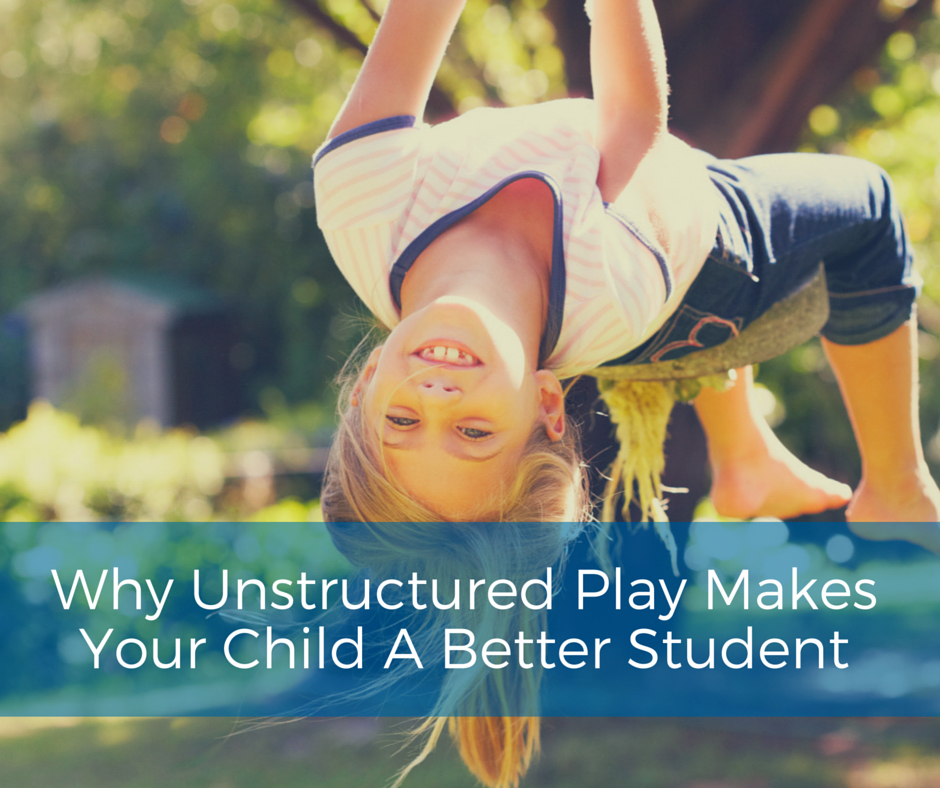

As educators, we are always aware that the makeup of a child’s educational environment is the key to harnessing each child’s special gifts. All too often we see parents feeling obligated to fill their child’s schedules with adult-driven activities such as instrument lessons, dance, or organized sports. It has been our experience that children learn best in a safe, nurturing, and stimulating environment that extends beyond the classroom. Although there is value in those supervised, structured activities, unstructured playtime is an essential piece of your child’s development. When children are immersed in a diverse environment with abundant space and stimulating activities, they are empowered to reach their unique potential socially, physically, intellectually, and emotionally.
It’s no secret that children need to play, but a less known fact is that the benefits of playtime reach far beyond recreation. Free unstructured play in a safe environment helps children develop the skills that are required for success in and outside of school. It allows them time to create relationships, practice problem-solving, develop compassion as well as the tools needed for negotiation. When children have the time to create their own games and play freely, they are honing their creativity, learning to compromise, and practicing self-control. Allowing children to play in an unstructured environment builds confidence in the child and helps them develop resilience as they learn to interact and effectively communicate with others.
What Qualifies as Free Play?
Much of the confusion that surrounds the conversation about free or unstructured play is that many parents assume it means unsupervised play, which isn’t the case. Your child’s safety is always of the utmost importance. To provide your children with unstructured playtime in a safe environment, you must provide them with the right tools. These include enough space in which to play and interact freely, appropriate play materials and, most importantly, time. With these three components, your child will have the tools to learn about others and themselves, and will enjoy a healthy serving of stress relief purely through having fun.
Valuable Lessons Learned
The true value of unstructured playtime comes from self-education. As parents it is our responsibility to instill knowledge in our children, but some of the most valuable lessons are learned when we simply guide our children to learn from one another. By exploring different environments and relationships, children become more aware of the consequences of their actions, how to maintain relationships, and how to go about getting what they want.
For starters, unstructured play builds problem-solving skills. By giving our children the space they need, we are allowing them to fail and learn from their mistakes. If your child is putting a puzzle together, he or she may get frustrated when the pieces don’t fit right away. As parents, not stepping in may be difficult for us, especially when we know we can help so easily. However, by allowing the child to experience that frustration and continue to persevere, the sense of accomplishment that accompanies the completion of the puzzle reinforces a priceless lesson that will carry through many other areas of life.
Additionally, research shows that children develop important social skills when they are allowed to “play pretend.” Has your child ever pretended to be a chef or a waiter? Children emulate their parents and often will learn to substitute toys or objects they have on hand to enact real life situations. In this example, children are not only learning social skills but they are also learning to put sequence events (taking your order, preparing the food, serving the food). Additionally, when children play together, they are learning to take turns, interact, and share.
A child’s physical development may be more obvious when they are young, but it truly never stops. As children continue to grow they also continue to discover their physical boundaries and develop strength and motor skills. Although letting your child run free on a playground or watching them climb a tree for the first time may seem more dangerous than soccer practice, recent research at Loyola University Medical Center in Chicago suggests that children who spend more time in free, unstructured play suffer significantly fewer overuse injuries.
Why This Matters
Always remember that it’s important for your child to have the time to be “a kid” as it will have a significant impact on their performance inside of the classroom and beyond.
In recent years, we’ve seen playtime diminish, especially in the classroom. Unfortunately, the quest to mold our children into the best students they can be and the competitive nature of getting into top schools has often come at the cost of reducing play, increasing organized activities, and, in some cases, having schools eliminate recess and physical education. Although academics and extracurricular programs are important, they absolutely should not come at the cost of free play.
Recently, the American Academy of Pediatrics issued a report reinforcing with educators and parents alike that unstructured playtime is one of the healthiest things for our children: “The challenge for society, schools, and parents is to strike the balance that allows all children to reach their potential without pushing them beyond their personal comfort limits and while allowing them personal free time.”





